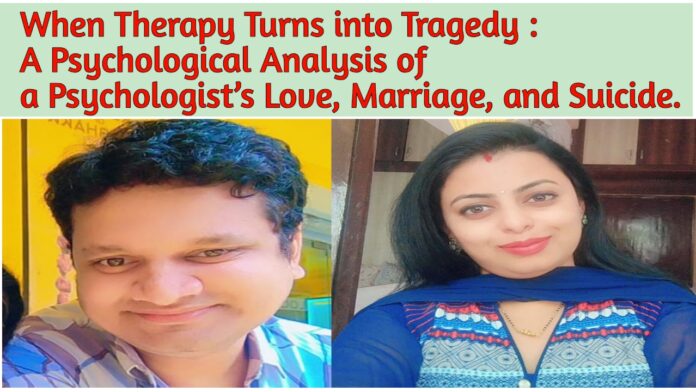Dr. keshavulu Bashavathini. MD. psy. Osm.
Senior psychiatrist. 8501061659.
A deeply tragic incident recently surfaced in Hyderabad. Noted clinical psychologist reportedly fell in love with one of her patients, eventually married him, but soon after, the relationship deteriorated drastically. Emotional and family conflicts emerged, ultimately leading to the psychologist taking her own life.
This is not just a personal tragedy—
it raises critical ethical, psychological, and societal questions:
Is it ethically acceptable for a therapist to marry a patient?
How do emotional dynamics shift when the lines between professional and personal life blur?
What kind of psychological stress leads a mental health expert—trained to handle crises—to end her life?
This essay attempts a deep, multi-dimensional psychological analysis of the incident.
The Therapist-Patient Relationship: Ethics and Boundaries
In psychotherapy, the therapist-patient relationship is based on trust, emotional safety, and clearly defined ethical boundaries.
Why are romantic relationships between therapists and patients forbidden?
Internationally accepted psychological ethics (such as from APA or Indian Psychiatric Society) prohibit romantic or sexual relationships with current or even recent patients.
The power imbalance in the relationship makes it non-consensual in a traditional sense. The patient is often emotionally vulnerable, and the therapist holds influence over their mind and decisions.
There’s a psychological phenomenon known as transference, where patients begin to project deep emotions (including love) onto their therapists, seeing them as protectors, caretakers, or ideal partners.
If a therapist responds emotionally or romantically to this, they are breaching the very core of clinical boundaries.
The Thin Line Between Empathy and Emotional Involvement…
Therapists are trained to show empathy without emotional entanglement. But sometimes, even trained professionals fall prey to emotional vulnerability—especially when:
The patient is persistent, emotionally expressive, or dependent.
The therapist is personally experiencing loneliness, unresolved emotional issues, or burnout.
The therapy extends beyond a few sessions and the emotional intimacy grows unchecked.
What appears to have happened in this case is that the therapist allowed emotional boundaries to dissolve. The patient, likely suffering from emotional distress, found attachment. The therapist, perhaps under stress or emotional fatigue herself, mistook transference for real love.
Marriage After Therapy – A Decision Made in Emotion?
Getting married to a former patient is highly discouraged—even after the formal therapy ends.
Why?
A patient’s perception of the therapist is often idealized, not based on real-life personality.
Therapy dynamics don’t reveal mutual flaws. Real life after marriage does.
A former patient may revert to dependency, expect healing even in marriage, or blame the therapist for emotional triggers.
In this Hyderabad case, the marriage may have been built on fragile emotional illusions rather than mutual understanding or compatibility. Once reality struck, the cracks became visible.
What Likely Went Wrong?
One partner was a caregiver; the other was a recipient of care. Such dynamics often lead to, Emotional imbalance, Blame cycles, Control issues
Family and Societal Pressure :
Reports suggest the psychologist’s family or in-laws were unsupportive, Inter-caste, inter-religion, or age differences may have worsened acceptance. Social stigma against a woman marrying a former patient might have contributed to emotional isolation.
Betrayal or Conflict:
If the partner (former patient) became aggressive, manipulative, or emotionally unstable, the psychologist may have felt trapped. In such cases, the very person you once healed can become the source of mental trauma.
When Therapy Turns into Tragedy :
A Psychological Analysis of a Psychologist’s Love, Marriage, and Suicide
Why would a psychologist, trained in mental health, die by suicide?
Contrary to public perception, mental health professionals are not immune to psychological pain. In fact:
They are often more exposed to human suffering.
They may suffer from compassion fatigue or vicarious trauma.
Self-neglect is common—many therapists do not seek help for themselves.
When a therapist’s personal and professional identity collapses, and when shame, loneliness, and public judgment mount, suicide becomes a tragic possibility.
When Love Crosses the Line of Responsibility…
Love is not a crime. But when love develops in a therapeutic context, it carries the burden of responsibility, power, and ethics.
In this Hyderabad case, a love story that started in a space of healing ended in irreparable tragedy. A psychologist—who devoted her life to healing others—died in pain, isolation, and possibly betrayal.
Let us not treat this story as gossip.
Let us treat it as a warning – of what can happen when professional lines are blurred, when emotional decisions override ethical reasoning, and when society fails to support those who dedicate their lives to healing others.
Finally :
Therapists are not gods. They are humans with hearts, vulnerabilities, and flaws.
Patients must understand that love born out of therapy may not be real—it could be attachment, transference, or emotional dependence.
Society must stop shaming people for failed relationships.
And above all, suicide is never the answer. There is always hope, help, and healing.








